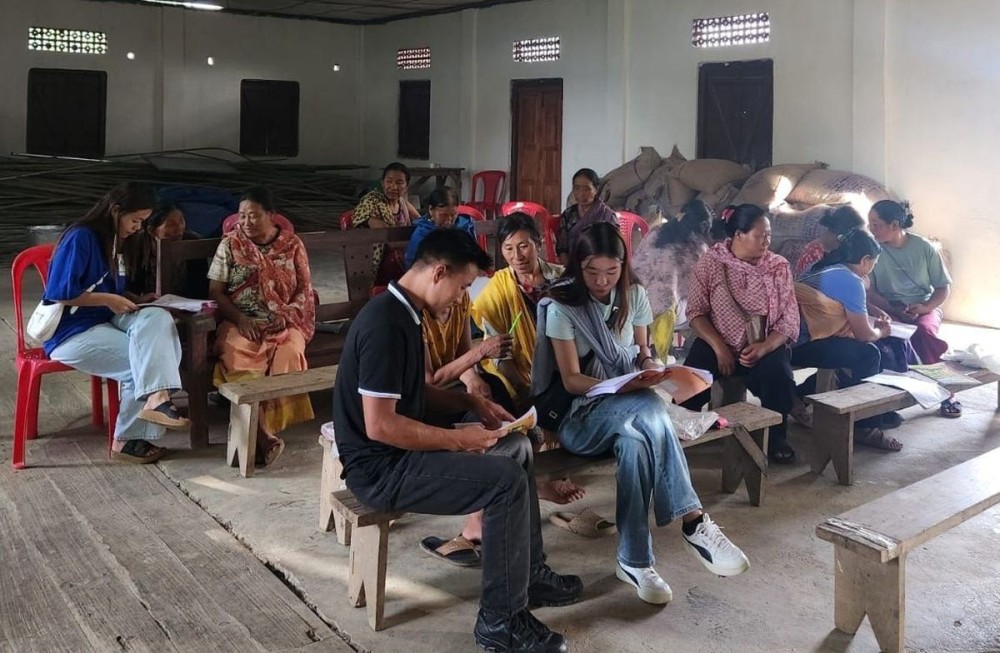Elderly women attend the night school for senior citizens in Tsungiki village under Wokha district.

86-year-old leads Wokha’s night school for elderly learners
Meribeni T Kikon
Wokha | July 24
Every Tuesday and Friday evening, after a long day’s work in the fields, 40 elderly women in Tsungiki village, Wokha district, gather at the community hall, not for rest, but for something many of them have never experienced before, formal education.
Launched on April 20, 2025, the night school for senior citizens has been running under the initiative of the District Administration, Wokha, as part of the PRI–CBO Convergence Project. It is a collaborative effort with the Education Department and facilitated by the Nagaland State Rural Livelihoods Mission (NSRLM).
The programme currently has 40 elderly women enrolled, all aged 60 and above. Among them is 86-year-old Njano Ngullie, the oldest learner in the group. Each of these women has spent her life labouring in the fields to support their livelihood. Despite their hard lives and age, they now gather every week with the determination to read, write, and count basic skills they were denied in their youth.
Classes are held twice a week - Tuesday and Friday - at the village community hall. They begin around 4:00 PM, after the women finish their work in the fields, and usually last for two to two-and-a-half hours, depending on the learners’ comfort. The sessions are designed to accommodate their pace, with flexibility to ensure no one is left behind. All 40 enrolled learners are farmers working at fields, most of who have never been to school before.
The spark for this initiative came from the village’s Self Help Groups (SHGs), who identified the need during their Village Poverty Reduction Plan discussions. A component of the annual Gram Panchayat Development Plan (GPDP) meetings held every November. It was through this platform that the SHG and Village Level Organisation (VLO) members proposed adult literacy as a necessary step forward. The primary objective was “to teach the women how to read and write their names, sign documents, and understand basic numbers.” A life skill they need for everyday tasks like handling bank transactions and navigating official procedures.
Teaching duties are shared by four selected community cadres from within the SHG network, assisted by trained VLO office bearers under NSRLM. The Education Department supported the classes by providing foundational learning materials. The same books used in nursery and LKG levels to help the learners begin from scratch.
Chonbemo, SHG Area Coordinator of Tsungiki, shared that the initiative also received financial support from the district administration and encouragement from the District Administration through the District Hub for Empowerment of Women (DHEW) under the Beti Bachao Beti Padhao scheme. This support includes certification for all enrolled learners, which will be distributed at the conclusion of the three month programme by the end of this month.
Renbeni, the SHG Village Facilitator, who has been actively teaching the learners, spoke about the early challenges.
“All of them were completely illiterate when we started. In the beginning, we had to hold each of their hands to guide them in writing, letter by letter. We did this for about a month. Slowly, they began learning to write on their own. Now, many of them can write their names, count from 1 to 100, and even write the name of the village “TSUNGIKI’,” she said.
“They have all mastered capital letters, although a few still struggle with lowercase letters. But the improvement is visible and steady.”
While the pace is understandably slow, especially for those in their late 70s and 80s, the enthusiasm remains high. The impact of these basic skills is already being felt. With growing reliance on written signatures over thumb impressions at banks and offices, being able to sign one’s name has become essential. For these women, learning how to sign documents independently is empowering.
Renbeni shared that many of the learners have expressed gratitude, often saying they never imagined they would ever be able to write. “They thank us for taking the time to teach them something they thought was beyond their reach. Their happiness is genuine and touching.”
The night school is set to conclude this month, with certificates to be awarded by DHEW in recognition of the women’s dedication and progress.






